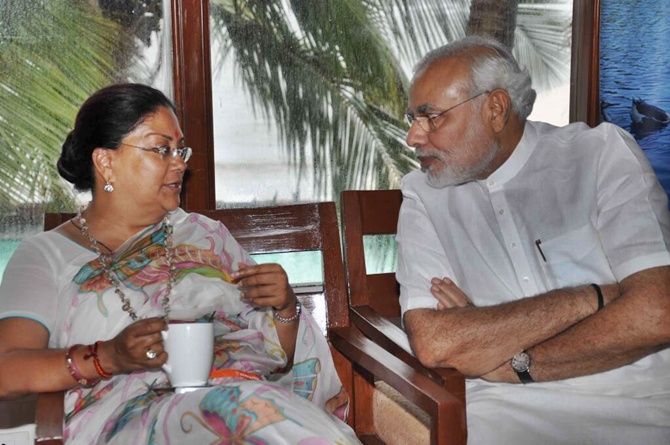Rajasthan has taken the lead on structural reforms which could help India attract business and employ a fast-growing workforce.

The reformist government that many Indians and free-market flag-bearers had hoped would emerge after this year's election isn't in New Delhi - at least not yet. It's a dusty day's drive to the southwest.
Rajasthan, derided as a poverty-stricken laggard, has taken the lead on structural reforms that, their backers argue, could also help Asia's No.3 economy as a whole to attract business and employ a fast-growing workforce.
Chief Minister Vasundhara Raje has shaken up labour, land and welfare policies with such verve Prime Minister Narendra Modi, a party ally, has even poached her chief of staff and put him in charge of the central finance ministry.
In her most controversial achievement since winning a second term a year ago Raje, 61, enacted reforms to a law hated by industry that made it almost impossible to lay off workers.
Raje, descended from royalty that once ruled the "Land of Kings", told Reuters her goal is to "create a habitat for employment" - not to destroy jobs.
"We have no intention of hurting anyone," she said in capital Jaipur. "We have to open up every single employment opportunity."
Rajasthan and the rest of India face other obstacles besides a freer labour market: woeful infrastructure, red tape and corruption. India slipped to 142nd in the World Bank’s latest 'ease of doing business' rankings.

Daikin, a Japanese maker of air conditioners that is the largest outside investor in Rajasthan, welcomes Raje's resolve on reforms. But it has yet to decide whether to build a second plant in the state.
"If India has to become a global force in manufacturing, all these issues need to be looked into," said Kanwal Jeet Jawa, Managing Director at Daikin India.
Prime Minister Narendra Modi, the first state leader to become prime minister of India, is cheering on allies like Raje in states ruled by his nationalist Bharatiya Janata Party (BJP).
Modi, 64, has made slow progress with his own reforms aimed at launching a Chinese-style manufacturing boom he calls “Make in India”, despite winning India's biggest election mandate in 30 years this May. Crucially, the former chief minister of Gujarat lacks a Rajya Sabha majority, hobbling his ability to pass tough measures to pull the economy out of a growth slowdown.
Redrawing relations
Raje describes her approach as "a lot of common sense with some economics". She also frankly admits she is starting from scratch. Rajasthan, a byword for rural poverty, has barely attracted any foreign investment since her first five-year term ended in 2008.
In constitutional terms, though, Raje could act as a catalyst for far-reaching change.

By activating a rarely-used clause that allows state law to supersede central law as long as it wins presidential approval, Raje has broken the impasse in two crucial areas where New Delhi shares responsibility with India's states - labour and land law.
In July, she pushed amendments to the Industrial Disputes Act of 1947 through the state legislature allowing firms in Rajasthan to lay off up to 300 workers without government permission, up from 100 before. President Pranab Mukherjee has just given his assent.
Raje has wielded her four-fifths majority to tackle another chronic obstacle to investment in India - land acquisition. A bill to expedite land purchases for public purposes was passed in September and awaits the president's signature.
The bills are key planks of a raft of initiatives, ranging from skills development to streamlining welfare, that aim to triple economic growth to 12 percent and create 1.5 million jobs in Rajasthan.
 India's largest state by area is the size of Germany and its 69 million population is as big as Thailand's.
India's largest state by area is the size of Germany and its 69 million population is as big as Thailand's.
"This is the thin end of a very thick wedge – it may be the true coming of a federal nation," said Manish Sabharwal, an adviser to Raje and co-founder of recruitment firm Teamlease.
Sabharwal faults India's labour laws as "marriage without divorce". The inability to fire makes firms reluctant to hire, he says, threatening to cause a demographic bust in a country of 1.25 billion where half the population is under 25 and a million people join the workforce each month.
Labour and social activists reply that Raje's reforms will only exacerbate job insecurity in India, where just 8 percent of manufacturing workers are in formal employment. Many of the rest are short-term contractors.
"Now the companies will look to do away with permanent and regular workers, and employ more and more contract labour," said Rajya Bihari Sharma, the Rajasthan head of the Bharatiya Mazdoor Sangh trade union that is affiliated to Modi's party.












 © 2025
© 2025